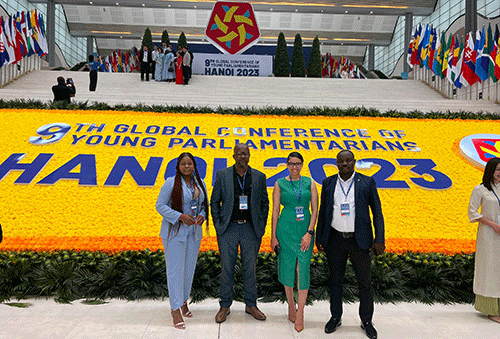Member of Parliament Inna Hengari said countries are built on ideas and not on rhetoric, and there is a need to ensure the current circumstances of unemployment, poverty and inequality are addressed without taking away more jobs, using the fourth industrial revolution.
Hengari added there is no one-size-fits-all plan or strategy to address various issues countries face.
“When we talk about cultural diversity in technology or about the fourth industrial revolution, we also need to now sit down and redefine what that means for Africa in general – but in particular, Namibia,” stated Hengari during the ninth Conference of Young Parliamentarians in Hanoi, Vietnam.
The conference, organised by the Inter-Parliamentary Union (IPU)2, is a unique platform for young members of parliament to meet, exchange, learn and identify common and innovative strategies to advance youth empowerment.
The youth activist added that through this conference, it became more evident that no country can operate and exist in isolation, and youth should take centre stage.
“That is why conferences such as these are crucial because we get to learn and borrow from each other as members of parliament. I believe the exchange is important because countries are built on ideas,” she reiterated.
She also highlighted the importance and role that cultural diversity plays: “We have spoken about cultural diversity and strategies on how we can maintain them. How do we ensure, for example, those cultural practices that are harmful – those that encourage child marriages – don’t see the day of light”.
Hengari noted that there are equally cultural practices –even – in this era, that can be used to harness someone’s talent, saying, as a country, there is a need to invest in that.
Furthermore, Hengari observed that many Asian nations heavily invest in art, something she wishes countries like Namibia could pay additional attention to.
She stated: “Asian countries invest in arts and culture. Africa still has a long way to go. We have seen the potential that the industry holds. I believe once given the support, given the necessary investment or at least given the environmental side, they can successfully be able to lobby for themselves on their own if such a time comes for support. Or even just in building and establishing institutions of arts and culture”.
Fellow MP Patience Masua, who also attended the conference, said the theme, ‘Digital Transformation for Sustainable Development’, emphasised the prominence of embracing the Fourth Industrial Revolution for sustainable economic development.
“We explored ways to promote digital transformation through legislative and policy measures. This included debating laws that facilitate innovation, protect digital rights and create an enabling environment for digital entrepreneurship,” she passionately stated.
Masua added that the session on addressing digital inequality and ensuring equitable access to technology were key priorities, such as the importance of raising digital awareness, enhancing digital skills and fostering connectivity in underserved communities.
She said Namibia’s participation in conferences like these is essential for staying informed about global trends and best practices, contributing to international dialogues and building valuable partnerships.
“It enhances our capacity to address domestic challenges effectively and positions the country as an active and engaged participant in the global community,” said Masua.
– psiririka@nepc.com.na


